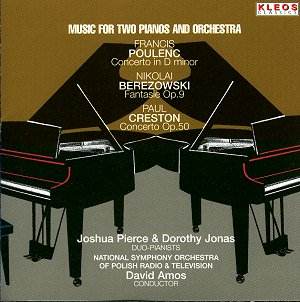Music for two keyboards and orchestra can be
found from Bach to Mozart, then the solo piano got into its own
with Beethoven. Composers clearly felt its greater power of sound
and the virtuosity increasingly demanded of performers was adequate
to compete with a full orchestra, so they fall out of favour somewhat
in the 19th century. Bruch produced one in 1915, which
was a reworking of a suite for organ, but those origins in the
Baroque era were not forgotten and produced a revival during the
20th century reflected in neo-classical works of Stravinsky
and Bartók. The best contribution to the genre came in
1932 from Poulenc. It was a commission from the American heiress
(to the Singer sewing machine fortune) who married into the French
aristocracy to become Princess Edmond de Polignac, and an important
patron of music in the 20th century. Poulenc and Jacques
Février played the concerto for the first time at the Teatro
la Fenice with the orchestra of La Scala, Milan on 3 September
1932, and later committed it to vinyl under Prêtre. Itís
a beautiful work, full of Gallic wit and charm, with instantly
recognisable chunks of Bach and Mozart (i.e. the start of each
of the first two movements respectively), and the tasteful vulgarity
of a nose-thumbing maverick. Itís given a racy performance on
this disc, at times a shade too fast for comfort or detail, but
the result is exhilarating and the virtuosity of the two soloists
impressive, while conductor and orchestra manage to keep up -
just.
Despite its curiosity value (and this is its
first appearance on disc) Berezowskyís Fantasie is hard
to regard as anything more than just a harmless filler between
the concertos of Poulenc and Paul Creston. This is Russian folk
style with an expertís handling of orchestration in the Rimsky-Korsakov
tradition, all blended with what is not more than a mild dose
of dissonance. Berezowsky spent the bulk of his life in America
after the Russian revolution drove him away in 1920. He was then
primarily a violinist (in the Coolidge Quartet) and conductor
at CBS. More interesting, however, is Crestonís concerto (another
world premiere recording). He too was an immigrant to America
(born Giuseppe Guttoveggio) but of a poor Italian family and largely
self-taught. His output became prolific and he won an impressive
string of awards and prizes before establishing himself as an
eminent teacher. This concerto is an attractive piece, skilfully
crafted in the neo-classical style and recognisably American too
with some complexities in its distinctive rhythmic shapes, a lovely
central Pastorale followed by a racy Italianate Tarantella
for a finale.
A highly commendable disc, the playing of the
highest calibre despite the caveat of occasional breaches
of the speed limit in Poulencís classic.
Christopher Fifield
see also review
by Rob Barnett
